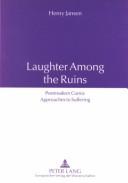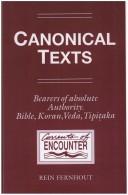| Listing 1 - 10 of 22 | << page >> |
Sort by
|

ISBN: 0820453749 Year: 2001 Publisher: Frankfurt am Main : Lang,
Abstract | Keywords | Export | Availability | Bookmark
 Loading...
Loading...Choose an application
- Reference Manager
- EndNote
- RefWorks (Direct export to RefWorks)
Book
Year: 1995 Publisher: Amsterdam Vrije Universiteit
Abstract | Keywords | Export | Availability | Bookmark
 Loading...
Loading...Choose an application
- Reference Manager
- EndNote
- RefWorks (Direct export to RefWorks)
Book
Year: 1995 Publisher: Amsterdam Free university Amsterdam
Abstract | Keywords | Export | Availability | Bookmark
 Loading...
Loading...Choose an application
- Reference Manager
- EndNote
- RefWorks (Direct export to RefWorks)

ISBN: 9051837526 9789051837520 Year: 1994 Publisher: Amsterdam: Rodopi,
Abstract | Keywords | Export | Availability | Bookmark
 Loading...
Loading...Choose an application
- Reference Manager
- EndNote
- RefWorks (Direct export to RefWorks)
Book
ISBN: 9783643910226 9783643960221 Year: 2018 Publisher: Zurich Lit
Abstract | Keywords | Export | Availability | Bookmark
 Loading...
Loading...Choose an application
- Reference Manager
- EndNote
- RefWorks (Direct export to RefWorks)
This collection of essays presents the reader with a fine overview and detailed discussion on the impact of interreligious studies and intercultural theology on methods and methodologies. New fields of study require new methods and methodologies, and, although these two new fields draw from a host of existing other disciplines and areas of thought and are almost transdisciplinary in nature, they nonetheless influence existing methodologies and help them evolve in new directions.
Book
ISBN: 9789042032798 9789042032804 9042032804 1283009323 9781283009324 9042032790 9786613009326 6613009326 Year: 2011 Volume: 39 Publisher: Amsterdam [etc.] Rodopi
Abstract | Keywords | Export | Availability | Bookmark
 Loading...
Loading...Choose an application
- Reference Manager
- EndNote
- RefWorks (Direct export to RefWorks)
Can one maintain one's religious identity without closing oneself from the other? In general, Christian reflection on interreligious dialogue begins with a theological reflection on religious plurality that assumes that one cannot engage seriously in interreligious dialogue without a sound theology of religions. In this book, Marianne Moyaert critically assesses the various models for a Christian theology of religions (exclusivism, inclusivism, pluralism, particularism) by asking how these models relate to the dialogical tension between openness and identity. She argues that we need to overcome the classical theological approach of religious plurality and move in the direction of a theological hermeneutics of interreligious hospitality. To that end she turns to Paul Ricoeur, whose philosophical and hermeneutical insights can give a new turn to the discussion of the criteria, possibilities, and particularly the limits of interreligious dialogue.
Christian fundamental theology --- Academic collection --- 291.16 --- Verhouding tussen de godsdiensten. Verdraagzaamheid. Interreligieuze dialoog --- 291.16 Verhouding tussen de godsdiensten. Verdraagzaamheid. Interreligieuze dialoog --- Dialogue --- Religions --- Religious pluralism --- Pluralism (Religion) --- Pluralism --- Religion --- Interreligious relations --- Relations among religions --- Religious aspects --- Relations --- Christianity and other religions. --- Theology of religions (Christian theology) --- Theology, Doctrinal. --- Theology, Doctrinal --- Christian doctrines --- Christianity --- Doctrinal theology --- Doctrines, Christian --- Dogmatic theology --- Fundamental theology --- Systematic theology --- Theology, Dogmatic --- Theology, Systematic --- Theology --- Christianity and other religions --- Syncretism (Christianity) --- Doctrines --- History --- Religions. --- Open theism. --- Free-will theism --- God, Open view of --- God, Openness of --- Neotheism --- Open view of God --- Openness of God --- Openness theology --- Theism, Open --- Comparative religion --- Denominations, Religious --- Religion, Comparative --- Religions, Comparative --- Religious denominations --- World religions --- Civilization --- Gods
Book
ISBN: 9789021143088 Year: 2011 Publisher: Zoetermeer Meinema
Abstract | Keywords | Export | Availability | Bookmark
 Loading...
Loading...Choose an application
- Reference Manager
- EndNote
- RefWorks (Direct export to RefWorks)
Book
ISBN: 903900241X 9789039002414 Year: 1995 Publisher: Kampen: Kok Pharos,
Abstract | Keywords | Export | Availability | Bookmark
 Loading...
Loading...Choose an application
- Reference Manager
- EndNote
- RefWorks (Direct export to RefWorks)
Feminist theology --- Fall of man in literature --- 230*711 --- Feministische theologie --- 230*711 Feministische theologie
Book
ISBN: 9048551870 9463726837 Year: 2020 Publisher: Amsterdam : Amsterdam University Press,
Abstract | Keywords | Export | Availability | Bookmark
 Loading...
Loading...Choose an application
- Reference Manager
- EndNote
- RefWorks (Direct export to RefWorks)
God's diplomat, the pope of the ecumenical movement, but also an acerbic theologian and a difficult person: this is how journalists characterised Willem Adolf Visser 't Hooft (1900-1985). He was one of the best-known Dutch theologians outside the Netherlands and he left his mark on the world church. Even at an early age he made profound efforts in support of international ecumenical youth and student organisations (Dutch Student Christian Movement, YMCA and World Student Christian Federation). He led the World Council of Churches during its formative stages (from 1938), and after its formal establishment in 1948 became its first general secretary, serving until 1966. To Visser 't Hooft, the unity of the church was both an article of faith and of a pragmatic organisation of church influence in a disunited world.
History. --- BIOGRAPHY & AUTOBIOGRAPHY / Religious. --- Church renewal. --- Church unity. --- disappointment. --- globalisation. --- institutionalisation. --- reconciliation. --- Theologians --- Visser 't Hooft, Willem Adolph,
Book
ISBN: 9789004420069 9004420061 9789004420076 900442007X Year: 2020 Publisher: Leiden Boston Brill | Rodopi
Abstract | Keywords | Export | Availability | Bookmark
 Loading...
Loading...Choose an application
- Reference Manager
- EndNote
- RefWorks (Direct export to RefWorks)
"In The European Encounter with Hinduism Jan Peter Schouten offers an account of European travellers coming into contact with the Hindu religion in India. From the thirteenth century on, both traders and missionaries visited India and encountered the exotic world of Hindus and Hinduism. Their travel reports reveal how Europeans gradually increased their knowledge of Hinduism and how they evaluated this foreign religion. Later on, although officials of the colonial administration also studied the languages and culture of India, it was - contrary to what is usually assumed - particularly the many missionaries who made the greatest contribution to the mapping of Hinduism".
Missions --- Europeans --- Christianity and other religions --- Hinduism --- 294.5 --- 266 <540> --- 266.1*41 --- Christianity --- Syncretism (Christianity) --- Religions --- Ethnology --- Brahmanism --- 266.1*41 Missie en hindoeïsme --- Missie en hindoeïsme --- 266 <540> Missies. Evangelisatie. Zending--India --- 266 <540> Missions. Evangelisation--India --- Missies. Evangelisatie. Zending--India --- Missions. Evangelisation--India --- 294.5 Hindoeïsme--(in strikte zin) --- 294.5 Hindoeïsme:--verder in te delen zoals 291.1/.8 --- Hindoeïsme--(in strikte zin) --- Hindoeïsme:--verder in te delen zoals 291.1/.8 --- History --- Hinduism&delete& --- Relations&delete& --- Christianity&delete& --- Relations --- Theology. --- Religion. --- History.
| Listing 1 - 10 of 22 | << page >> |
Sort by
|

 Search
Search Feedback
Feedback About UniCat
About UniCat  Help
Help News
News